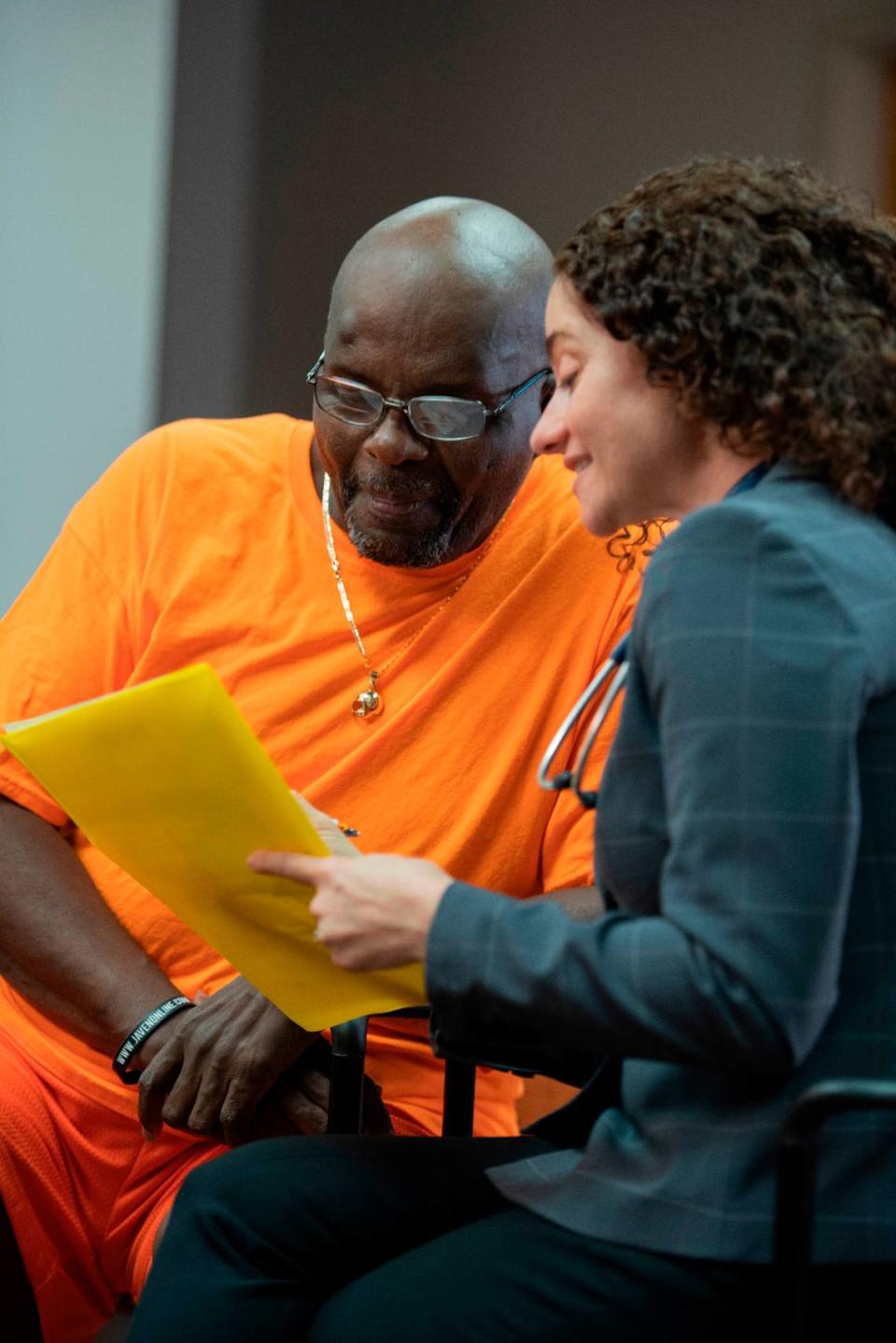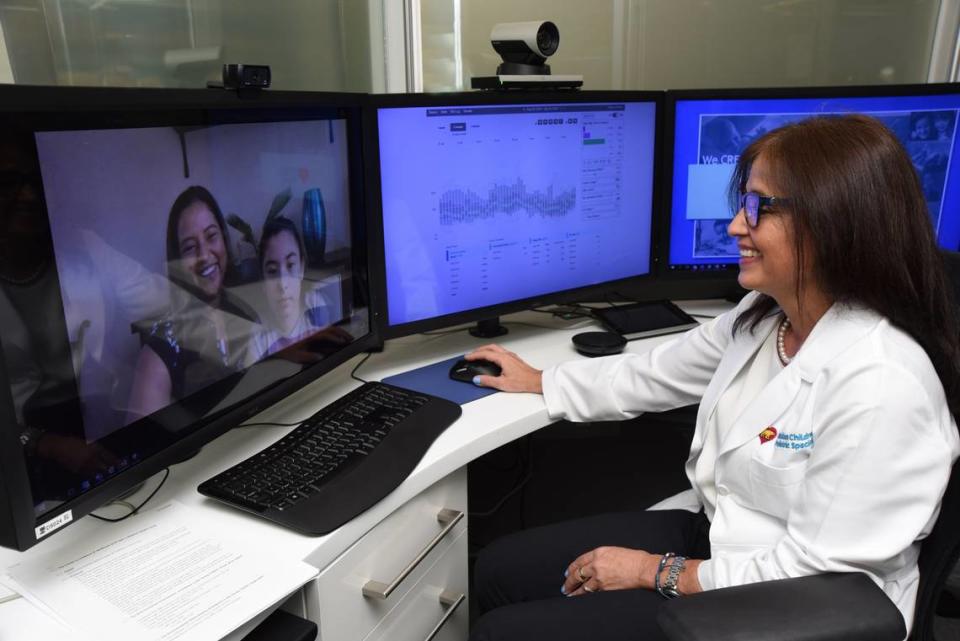If you’re diabetic, COVID is not the time to stop talking to your doctor
With cases of COVID-19 rising at alarming rates, this is a scary time for diabetics.
Many know they are at higher risk for serious complications and longer hospitalizations if they contract the virus and are reluctant to go out even to keep appointments with their doctors.
“They’re almost paralyzed, especially the older patients. They don’t want to leave their homes for any reason,” said Dr. Clifford Medina, chief of general medicine at Mount Sinai Medical Center in Miami Beach.

But doctors say — even with a pandemic going on — patients who delay their diabetic care may be setting themselves up for an array of other long-term complications and they could become sicker if they get coronavirus and their diabetes is not well controlled.
“It’s a problem. Diabetes is a chronic disease that needs to be actively managed. Otherwise, it can have very negative consequences on overall health,” said Medina.
Patients whose blood sugar is not well controlled are at risk of developing high blood pressure as well as high cholesterol and high triglycerides.
Medina calls the combination of diabetes with high blood pressure and high cholesterol “the triple threat.” Uncontrolled diabetes can lead to long-term complications, such as stroke, heart disease, retinopathy that can cause blindness, kidney failure, neuropathy, peripheral artery disease and amputations.
Pandemic stress can cause sugar levels to rise
Some parents of diabetic children also have been reluctant to take them to a doctor’s office for maintenance visits because they fear if their child gets the virus, they could infect more vulnerable adults in their households, said Dr. Adriana Carrillo-Iregui, a pediatric endocrinologist at Nicklaus Children’s Hospital.
“Especially in the beginning of the pandemic, parents weren’t coming to the hospital because they were afraid of exposing their kids to COVID-19. Parents were very anxious; kids were also scared, and anxiety brings up sugar levels,” said Carrillo-Iregui.
Because parents were putting off hospital visits, Carrillo-Iregui said it’s been more common for Nicklaus doctors to treat children for uncontrolled diabetes rather than COVID-19 because kids are more likely to be asymptomatic than adults.
The pandemic also has thrown the schedules of some diabetic kids out of whack. They may be staying up late if they don’t have to attend in-person classes or eating at odd times. “Some children are eating healthier at home, but we also have the opposite scenario where they are at home and eating all the time,” she said.
“We’ve tried to make sure they are taking care of themselves. Diabetes is a 24-7 job for kids and their parents,” she said.
Diabetics need to stay in touch with their doctors
Regular diabetic care during the pandemic is a must, doctors say.
“The better you control blood sugar levels, the less chance of developing debilitating complications that can result in a reduced lifespan,” said Medina.
Diabetic patients need to stay in touch with their doctors to confer about adequate medication levels and their blood sugar readings as well as to have other conditions they may have developed, such as cardiovascular disease or eye disease, monitored.
Diabetics also tend to be more prone to depression than the general population.
“If you’re very stressed and suffering from depression, patients may not want to take their medications as they should,” said Medina.

Richard Hennie, a Broward County diabetic who lost his sister and 23-year-old nephew to COVID-19, said he’s been especially vigilant about his health during the pandemic. “I refuse to get anxious about anything. I don’t miss any doctor appointments.”
For people who are skipping appointments during the pandemic, he has some blunt advice: “Please stop killing yourself. It’s so important to have good communication with your doctor and your team.”
Turning to telemedicine
To give diabetic patients peace of mind and to make sure they are still being monitored during the pandemic, many hospitals have turned to telemedicine — online visits with doctors.
At Nicklaus, patients are asked to download data from their continuous glucose monitors or insulin pumps prior to their online appointments. That allows doctors to see glucose levels over the previous two weeks.
Medina said even some elderly patients who may not be particularly tech savvy are managing to get online with the help of their families or a little extra tech support.
“They might need extra support staff to guide them through the first visit, but once they get through that visit, it’s easy,” said Medina. Patients who don’t have Internet can do visits over the phone with their doctors, he said.
Another strategy Mount Sinai doctors are using during the pandemic to make sure they are seeing diabetic patients regularly is to review patient lists to see who hasn’t come in lately, phone them and encourage them to schedule a wellness visit.
Doctors also check to see which patients haven’t refilled their prescriptions in a while and ask them to come in before they can get their prescriptions refilled, said Medina.
Patients also are encouraged to see the doctors treating their other diabetic-related conditions during the pandemic, said Medina.

Telemedicine has made keeping those other appointments easier, said Carrillo-Iregui.
Instead of having to visit multiple offices, now a child’s visit with a nutritionist or psychologist can be scheduled as part of a regular online appointment. “The other provider is just a click away now,” said Carrillo-Iregui.
The telehealth visits have worked so well, said Carrillo-Iregui, that after the pandemic is over, Nicklaus may alternate in-office visits with telehealth visits.
Zoom support groups for diabetic teens
Nicklaus also plans to start Zoom educational and support groups for teens, said Carrillo-Iregui.
“Maybe this is a nice time for people to focus on themselves in a healthy way,” said Dr. Amy Aronovitz, chief of adult endocrinology at Memorial Healthcare System in Broward County.
They may have more time to concentrate on preparing healthy meals if they are staying home and to exercise more if they are working from home and no longer commuting.
While she said she’s still hesitant to recommend diabetic patients return to a public gym for their exercise, Aronovitz said there’s plenty they can do from taking walks and bike rides and exercising outdoors to participating in online exercise classes and working out at home.
“You can help guide people toward healthy living with their telehealth appointments,” she said. “We’ve really worked hard to use telehealth to stay connected with our patients.”
Mimi Whitefield can be reached at mimiwhitefield@gmail.com or on Twitter @heraldmimi

